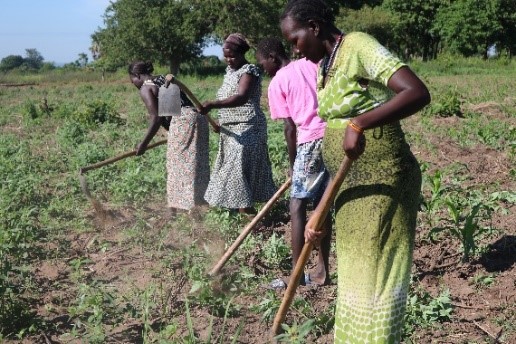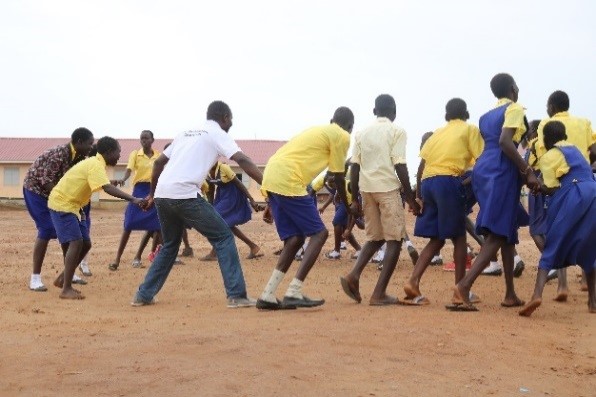Enhancing Nutrition, Water And Sanitation Hygiene (WASH) through play-based interventions
Enhancing Nutrition, Water And Sanitation Hygiene (WASH) through play-based interventions

Parents take part in planting crops for schools
The project in brief
Implemented by
Right to Play
Country
Uganda, West Nile- Adjumani
Duration
2017-2019
Description
Enhancing Nutrition, Water And Sanitation Hygiene (WASH) interventions in primary schools in the four refugee settlements and host communities in Adjumani district.
Project aims
Outcome 1:
7,880 conflict-affected South-Sudanese and vulnerable host community children have an improved access to safe, engaging and learning play spaces that promote social cohesion and stay in school.
Outcome 2:
28,031 South Sudanese refugees and host community children have improved knowledge, attitudes and practices on proper hygiene and sanitation practices and menstrual hygiene management as of November 2018. The 38 wash and Hygiene clubs formed in the schools have further improved children’s knowledge and awareness on personal hygiene and general cleanliness in their learning environment.
Resources used
The project uses a wide variety of resources to reach the targeted outcomes:
- Play Based Learning methodology resource base (Approaches, Manuals for capacity building).
- Government and implementing partners’ networks and structures for lobbying, advocacy and coordination of the project activities.
Partners
- Ministry of Education and Sports
- Office of the Prime Minister
- Adjumani District Local Government
- School / Centre Management committees and parents
- School Nutrition committees
- UNHCR
Challenges and how they were overcome
Challenges
- Transfer of trained teachers to non-implementing schools created implementation gap in schools.
- Limited hygiene facilities (washrooms, pit latrines, changing rooms & incinerators) within schools.
- Scarcity of water in schools affects the implementation of WASH activities.
- Pressure of increased enrolment on school resources e.g. Teacher/Child ratio, desks, toilets, classrooms and WASH facilities.
- Climate change seems to be affecting some school gardens.
- Lack of land to support gardens/agriculture in some schools.
How they were overcome
- Coaching and mentoring teachers to work with senior teachers with skills to support WASH and menstrual hygiene management activities.
- Lobbying and advocating for more learning facilities, especially classrooms, desks, and WASH facilities to match the number of students.
- Lobbying for construction of more classroom blocks through other organizations and projects within Right To Play.
- Supported play and sport activities by providing play materials like footballs, netball and skipping ropes.
- Community meetings were held to create more awareness and provide schools with land for gardens.
Results of the Good Practice
- Children from 10 schools have increased access to information on nutrition, WASH and menstrual hygiene.
- Children are able to cascade WASH and nutrition information to their peers
- School gardens started in 8 schools under supervision of school nutrition committees and parents;yields are adequate to sustain school feeding for two school terms
- Girls attendance of school has improved due to provision of Sanitary materials and WASH facilities in schools
- Enrollment and retention of school has also improved due to school feeding and engagement of children through Play Based Learning (PBL)
How the project meets the GCR Objectives
Objective 2: Enhance refugee self-reliance
The practice tries to enhance refugee self-reliance through:
- Provision of information on nutrition, WASH and menstrual hygiene, this has helped children maintain proper hygiene through the WASH facilities provided at school.
- Children have improved self-esteem and cascade WASH and nutrition information to their peers
- Their leadership skills have improved through PBL activities as such they are being groomed to become future leaders
- School gardens started in 8 schools under supervision of school nutrition committees and parents;yields are adequate to sustain school feeding for two school terms
- Girls attendance of school has improved due to provision of Sanitary materials and WASH facilities in schools
- Children and parents have skills in making reusable pads so they do not rely on development partners to provide for them.
- Enrollment and retention of school has also improved due to school feeding and engagement of children through Play Based Learning
Next steps
- The District Local Government Office through the Department of Agricultural acknowledges RTP’s work and approach used in working with school nutrition committees and continuous dialogue with parents to ensure attitude change. They also acknowledge support for the WASH and nutrition interventions and sustain the initiatives that yield a positive learning environment for their children.
- The Office of the Prime Minister has also committed to coordinate with the district local government to institutionalise school feeding as mandated by government.
Submitted by:
Jonathan Lea-Howarth, Country Director Rwanda & Uganda, Right to Play




